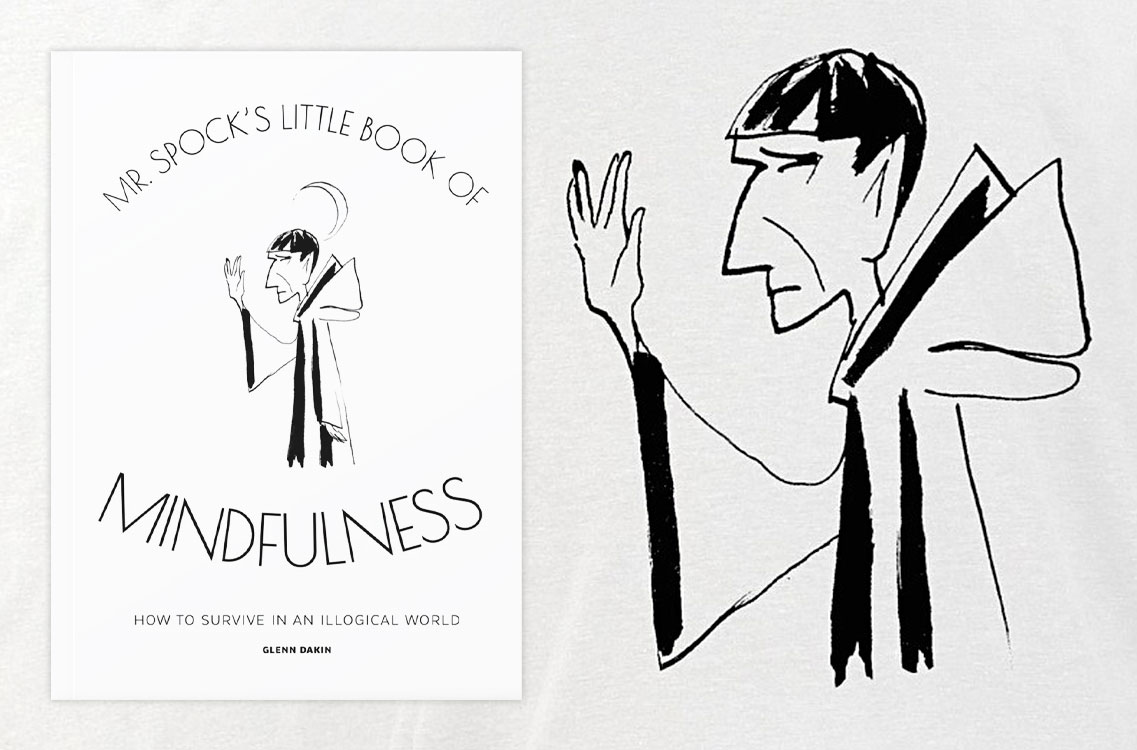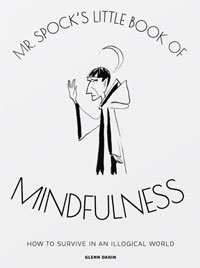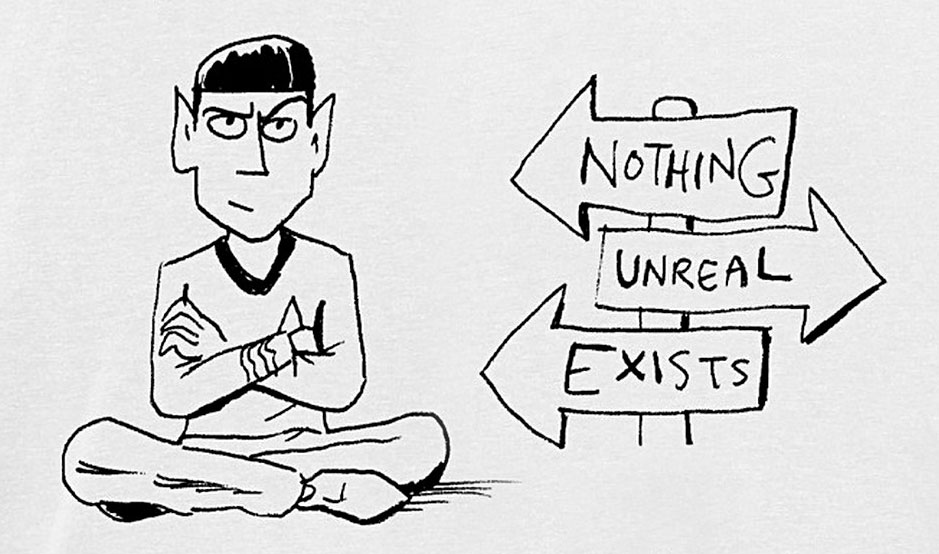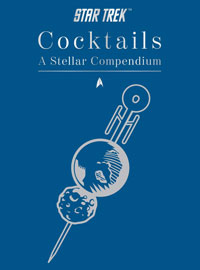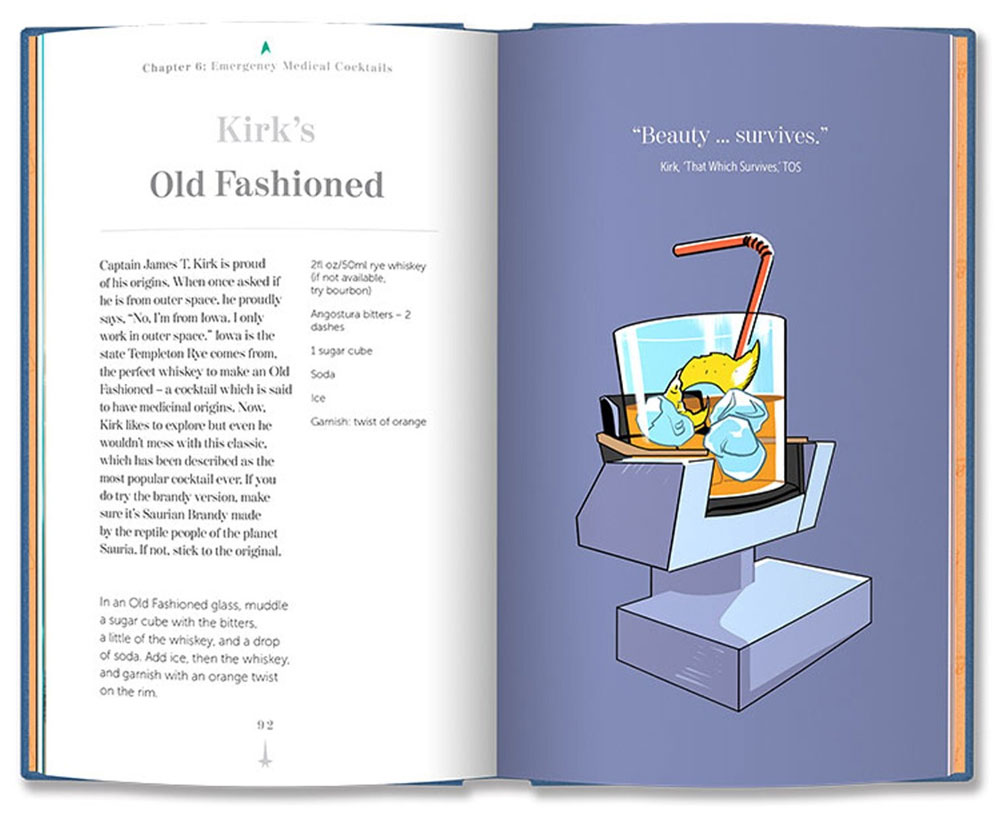Late last fall, we spoke with Hero Collector’s Ben Robinson about the company’s new expansion in to Star Trek publishing — and this month we had a chance to catch up with Glenn Dakin, the writer of several of the new Hero Collector books.
Dakin’s first release is one we reviewed back in December, the fun Star Trek: Quibbles with Tribbles search-and-find book, modeled after the popular Where’s Waldo? series and set in the classic Trek timeframe aboard Captain Kirk’s Enterprise.
(And yes, there’s already a Next Generation edition in the works!)
One of the more unique Star Trek publications from the last year is Mr. Spock’s Little Book of Mindfulness, Dakin’s collection of Vulcan wisdom and philosophy, meant to help folks get through this chaotic world.
We spent some time discussing how this book came to be, how a Vulcan-inspired outlook on life might benefit illogical, emotional human lives, and the backstory behind the cute illustrations that fill the book’s pages.
TREKCORE: How do you begin to get inside the mind of a character like Spock to even attempt to write something like this?
DAKIN: I rewatched lots of the Original Series, and the movies — at the same time, Spock was turning up in Discovery. There’s a lot of material there and it was great fun combing through it for his words of wisdom.
What the book tries to do is to take Spock’s wise words, and see if we can apply them to our own lives, and maybe get a few answers and a bit of help with our own daily ups and downs — from the point of view of Mr. Spock raising an eyebrow at us and saying maybe there’s another way.
Spock is always looking for another way, a calmer, more intelligent way of approaching problems. I think it’s quite nice, especially in the kind of a world we live in at the moment to try and get people to tune into that way of thinking.
It’s very close to the mindful way of thinking, which is very fashionable at the moment. We found a lot of similarities between ideas like where Mr. Spock says, “Now is all we have,” and in mindfulness, you have to get yourself into the now. Forget the future, forget the past, and just breathe and experience the now. That’s very much a Vulcan point of view.
Also, being nonjudgmental, Mr. Spock doesn’t call a rock monster a monster just because it’s a monster made of rock. He’s prepared to find out that it’s the mother with beautiful feelings for her many offspring as in the “The Devil in the Dark.” It’s about seeing beyond the surface of things.
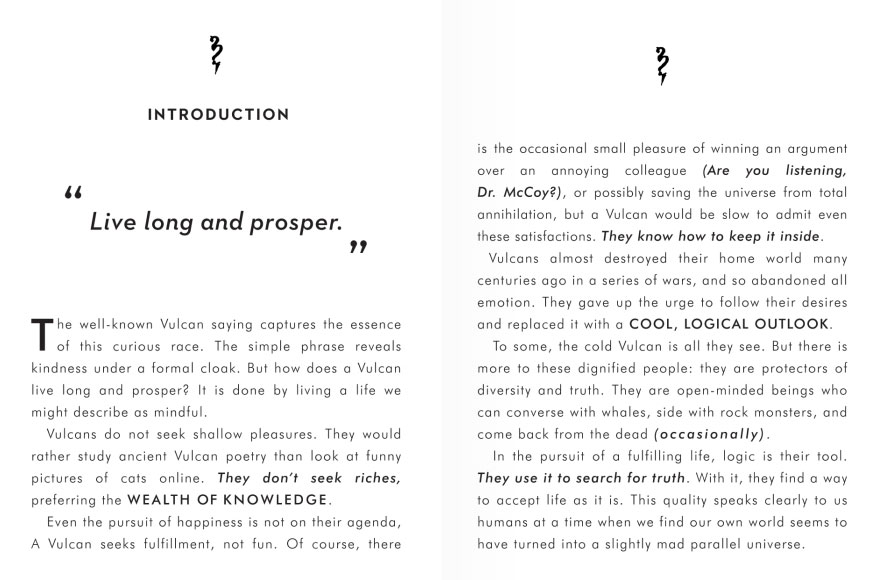
TREKCORE: There’s a lot of genuinely good life advice in here on living in the moment, on love, on self-acceptance, et cetera.
How do you balance the Star Trek-iness of it with the actually trying to provide people with some genuine advice that maybe you want them to take away from in terms of thinking about how to live their own lives?
DAKIN: It’s a big question as to how much you make the book for fans, and how much you make the book for people who want to read about wisdom and little fables that help people to understand life better.
At one point when I was working on the book, I was talking about how Spock says, “You may find that having is a lot less pleasing than wanting.” I was talking about something you may not want, like when somebody bringing their homemade pie into work for you to taste. Someone said to me, “Couldn’t that be a dish of Klingon live mealworms?,” translating that to the Trek world.
And then I was writing something about how sometimes people aren’t very forgiving, like if you go on holiday and there’s no WiFi in the place, your friends aren’t going to forgive you. I thought, “Wait a minute. It doesn’t have to be WiFi; it could be ‘no basic force field’ instead.”
I sort of got into the habit of replacing basic items from our universe with parallels in the Star Trek universe; anyone reading the book will soon get it. They’ll soon realize that we’re using simple parallels to Trek the book up. The Star Trek fans will enjoy the references.
TrekCore: There are a number of places where you have drawn upon Earth parables and the like, a little key to help people decipher the messages back from Star Trek language.
Glenn: Yes, I didn’t want us to simply say that all this wisdom was from the Buddhists and the Tao wisdom, or from famous thoughtful writers like Mark Twain, or leaders like Winston Churchill. Their presence in the main text was a bit distracting, so what we did was attribute some of the quotes from Churchill to a Ferengi politician — that sort of thing.
In the back of the book, of course, there’s a section where we give clues and we re-attribute the quotes back to their real source, just so that it gives people a chance to maybe do some further reading.
There’s a couple of parables that come from Buddhism, or from ancient Chinese folktales that we’ve said are Vulcan folktales. Just took some poetic license, I guess!
TREKCORE: We have to talk about the fabulous illustrations that accompany the text, these little vignettes of Spock finding himself in these difficult situations.
DAKIN: I started out as a cartoonist, and I used to write and draw my own comics when I was in my early 20s. That’s what led me into writing for TV animation and comics.
When I was at work — in the days when we were all still in the office — people would very often ask me to do a cartoon of something or rough something out if they needed an idea for something. I’d find myself drawing a picture of Batman or the Daleks just on a daily basis, roughing something out.
When we were putting the book together, I was asked if I’d like to illustrated it as well. “We don’t want people to open this book and think it’s serious life advice,” I was told, there was an effort to include an element of frivolity and fun about it.
I’m quite proud of the design that shows Spock sitting near a signpost pointing nowhere, saying, “Nothing Unreal Exists,” which is one of my favorite Star Trek quotes [from Star Trek IV: The Voyage Home].
There’s another one with Spock looking up at the clouds and seeing the shape of the pi mathematical symbol in the clouds, whereas, other people see rainbows and patterns in the sky. He sees mathematical symbols.
It was great fun. I just covered loads and loads of sheets of paper with drawings of Mr. Spock doing various things! I took them all into the office and the designers had fun with them, and it made the project a lot of fun for me as well.
TREKCORE: And some of them are already being used for merchandising at the Hero Collector website, I noticed.
DAKIN: It’s quite fun, and lovely for me to see my own art used in that way. Maybe once conventions start up again, you’ll pass somebody wearing a “Nothing Unreal Exists” shirt!
For the booze buffs among you, Dakin also crafted the intriguing Star Trek Cocktails: A Stellar Compendium that beamed down in November, with a range of adult recipes that span the Trek timeline.
TREKCORE: Were you writing both of these books at the same time? You were doing Mindfulness in the morning, and then you’re thinking about boozing in the afternoon?
DAKIN: We’d finished Mindfulness by the time I started on the Cocktails guide, because that one is something that we had planned a long way in advance.
Suddenly, there was a little gap in the publishing schedule — we had a meeting and decided we’ve got room to get out another book. Cocktails kind of came along at the last minute. Once it started to roll, it was such great fun, we couldn’t resist doing that one as well!
The project manager on that, Stella Bradley, she was very keen on that one and getting that one through and making it a lot of fun. It’s a slightly more colorful, slightly crazier book than Mindfulness, which is designed to be gentle and witty.
Cocktails is absolutely loaded with wacky and entertaining ideas for drinks. There’s funny quotes from the series, and a whole load of little vignette scenes in there when drink made an important appearance in the show.
We’ve had a lot of fun with that book.
TREKCORE: Outside of the now-closed Star Trek: The Experience, I often more associate Star Trek and alcohol with a fandom experience — but you actually make this really compelling case in the introduction about how important drink is to the franchise as a whole.
DAKIN: Yes, it’s not just important in Star Trek, I think it’s important in television. Scenes with drink in them — it’s a celebration, or it leads to a fight, or it’s a romantic moment — they can be very important signifiers of occasions.
What are people drinking in these moments? What did they talk about when they’re drinking? Often in Star Trek, drink comes up among friends or enemies meeting. It’s a good illustrator of key moments in the show.
A lot of it I think goes back to when Star Trek was first on, there were comparisons to Western shows. When I grew up as a kid, every other show on television was a Western, and drink was fundamental. Having a whiskey, getting drunk, fighting, going into the bar… every story had the big scene in the saloon and a fight breaking out. Classic Trek even did a little tribute to that in “The Trouble with Tribbles.”
Some of the funny episodes have got drink or drunken behavior in them, and it’s not just the Original Series. There’s a whole range of dramatic opportunities you get with people being drunk — or maybe sometimes you have an awkward or intimate drink between two characters.
There’s that very funny scene in The Next Generation episode “Conundrum” when Riker and Ensign Ro have a fling and then they’re there in the bar with Deanna Troi and there are lovely little awkward and funny moments like that in the series where they use the meeting in the bar.
Of course in Deep Space Nine, you’ve got Quark’s, with loads of funny scenes around the bar. There’s a lovely one when Bashir says he needs something to relax him and Quark gives him a Warp Core Breach and he says, “This will relax you for a few days.”
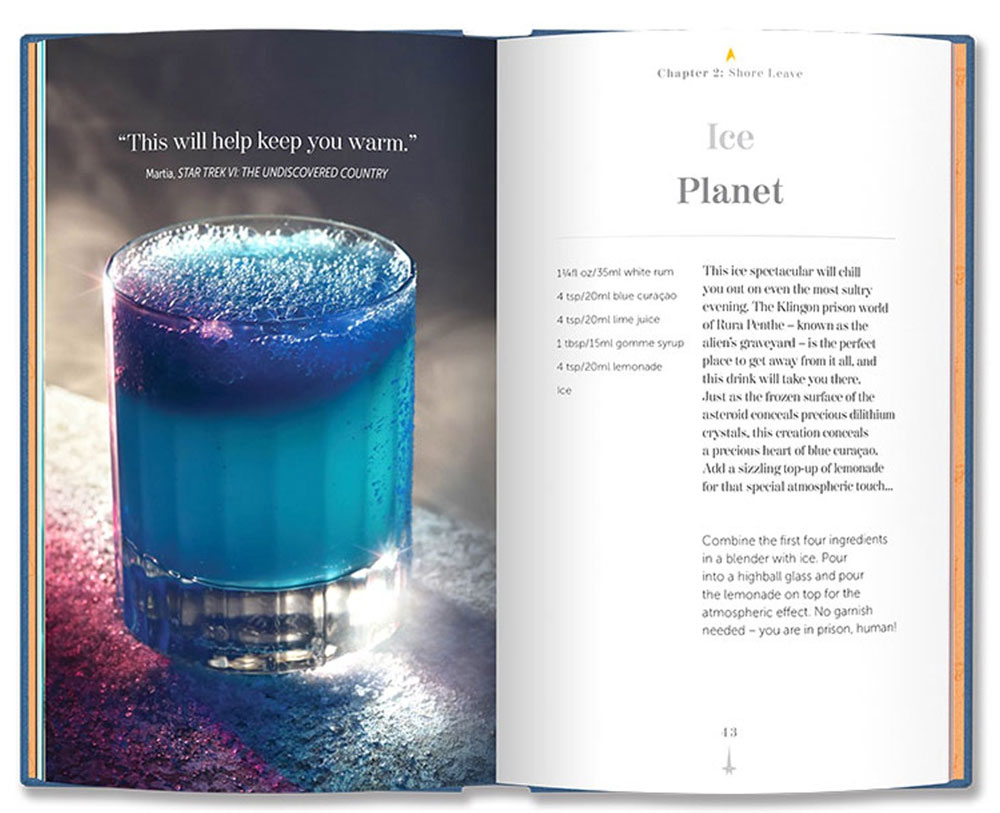
TREKCORE: How did you put together all the recipes?
DAKIN: Well, we adapted a number of real-world drink recipes for this book, but I didn’t invent all the new ones myself. I came up with the ideas for the cocktails, but we worked with two mixologists, Simon Pellet in Paris and Adrian Calderbank in London — each of whom are properly credited in the book.
Some of them, of course, we invented from scratch, like the Ice Planet — which is based on Rura Penthe — the Klingon Bird-of-Prey, and the Borg Queen. Simon was in Paris, Adrian was in London, and I was in Cambridge, and we worked together remotely during lockdown to work out their details.
Normally I would either invent the idea for the cocktail, or I would base it on an existing cocktail — or in some cases, we would take it from something in the Trek shows and we would do some guesswork to derive a recipe for it.
TREKCORE: Do you have any personal favorites?
DAKIN: Well, I really like the “Live Long and Prosper,” which is rather more of a light, refreshing cocktail, but my favorite I think is the “Trixian Bubble Juice,” which has sparkling water and tequila.
Some of the other ones are a bit more like the “Warp Core Breach”, which will blow your mind — it’s rather strong!
Portions of this interview have been condensed or edited for clarity.
![]()
Mr. Spock’s Little Book of Mindfulness and Star Trek Cocktails: An Interstellar Compendium are both available now through the links above.
Keep checking back to TrekCore in the days and weeks ahead for more book and product reviews as our journey into 2021 continues!

